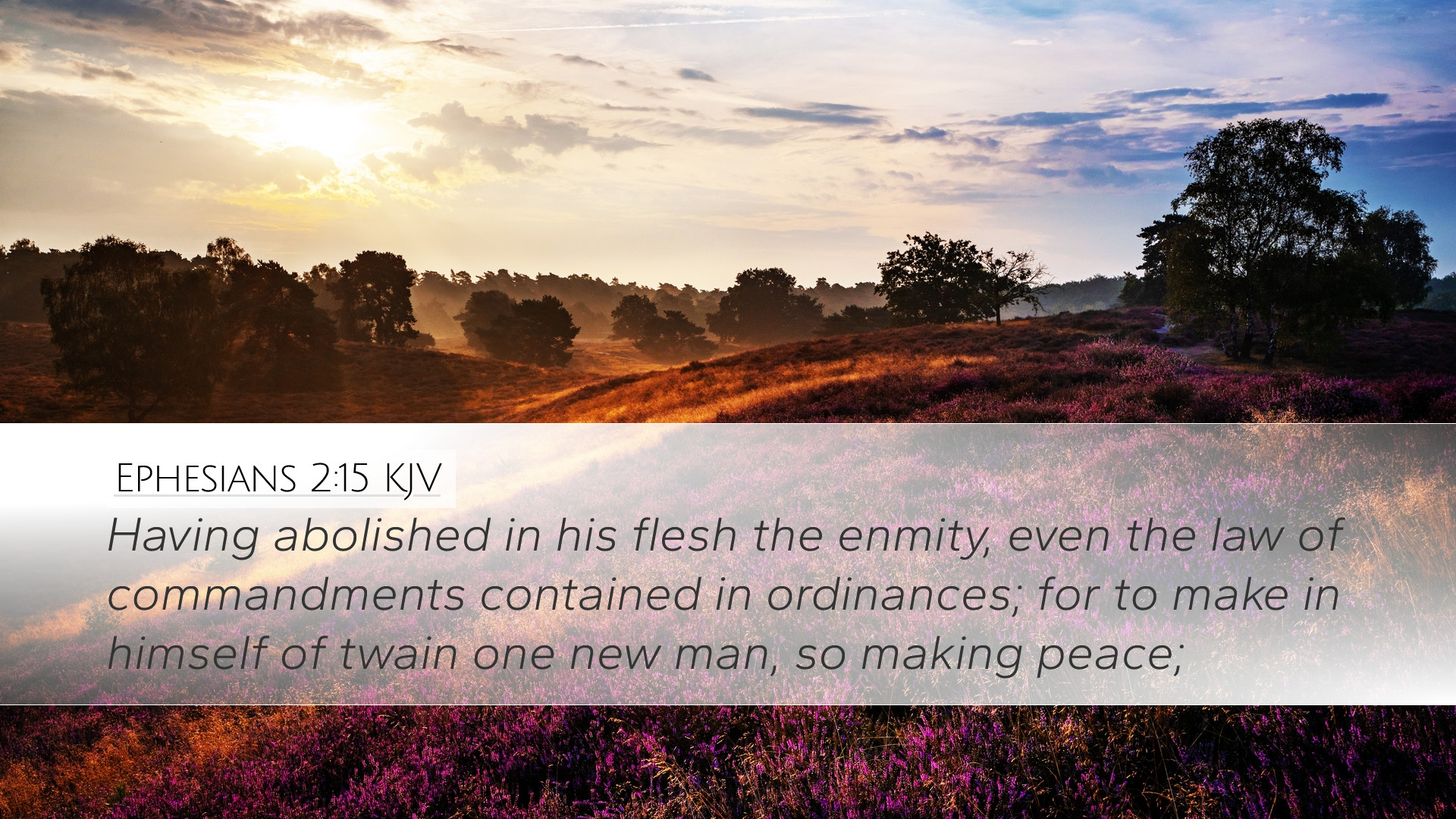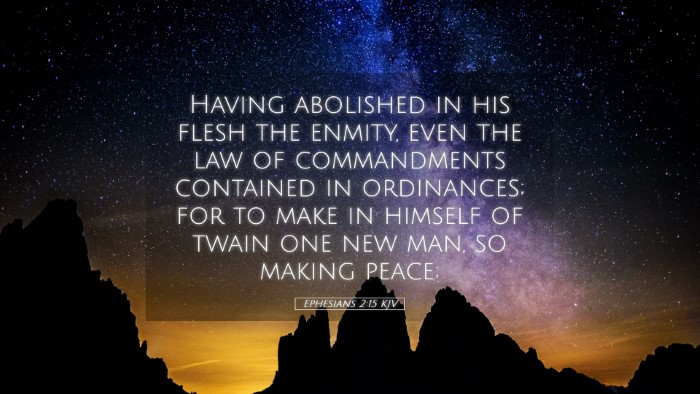Ephesians 2:15 - A Commentary
Text of Ephesians 2:15 (KJV): "Having abolished in his flesh the enmity, even the law of commandments contained in ordinances; for to make in himself of twain one new man, so making peace."
Introduction
This verse from the Apostle Paul’s letter to the Ephesians encapsulates the transformative power of Christ’s work on the cross. In it, Paul discusses the abolishment of enmity and the creation of a new humanity where Jews and Gentiles are reconciled through faith. This commentary seeks to explore the profound theological implications of this scripture, drawing insights from notable public domain commentaries.
Contextual Background
Ephesians is often regarded as a masterpiece of Pauline theology. It addresses various themes, including the nature of the Church, the unity of believers, and the cosmic scope of Christ's reconciliation. Understanding verse 2:15 requires a grasp of the context of division and hostility that existed between Jews and Gentiles in the early Church. Paul emphasizes that the Gospel transcends barriers and fosters a new identity in Christ.
The Atonement and Abolition of Enmity
Matthew Henry highlights that the “enmity” referred to is the division created by the Law, which distinguished the Jewish people from Gentiles. Christ’s flesh became the means through which this enmity was abolished. The use of the term “abolished” indicates a complete removal of barriers rather than mere reconciliation on the surface. Through His sacrifice, Jesus transformed the hostile relationship between two groups into a brotherhood in Him.
Albert Barnes builds on this by stating that the "law of commandments" signifies the Mosaic Law with its ceremonial aspects, which were particularly a source of division. In Christ, the requirements of the law that previously separated the two groups are set aside, making way for a new order of grace where believers are unified regardless of ethnicity or previous background.
The New Man: Unity in Christ
Paul introduces the concept of the "new man," a powerful image that signifies not just a new creation in the individual but a collective identity. Adam Clarke emphasizes that in essence, Christ's work produces a single entity that comprises both Jews and Gentiles. This “new man” is marked by peace, suggesting that the communal aspect of the faith is as crucial as individual salvation. The creation of this new humanity reflects the heart of the Gospel: reconciliation and community.
Theological Implications
Paul's assertion of the creation of one new man has significant theological implications. It challenges the persistence of divisions within the Church and calls believers to embrace a unified body of Christ. Matthew Henry notes that this teaching encourages the Church to focus on commonality rather than differences, invoking a powerful source of unity that stems from Christ.
Furthermore, Albert Barnes suggests that the removal of the law's ordinances implies that legalistic approaches to righteousness are rendered obsolete in light of grace. The underlining truth is that salvation through Christ is available to all, thus affirming the concept of a universal Church that transcends cultural and ethnic boundaries.
Practical Applications
This passage is relevant for pastors, students, and scholars as it invites readers to reflect on the nature of relationships both inside and outside the Church. Unity in Christ is not merely an abstract theological concept but has practical outworking:
- Encouraging Inclusivity: Churches should adopt a stance of inclusivity, embracing individuals from all walks of life as equals before God.
- Promoting Peace: As articulated in this verse, believers are called to be peacemakers, reflecting the character of Christ in relationships with others.
- Understanding Diversity: Celebrate diversity within the church as a reflection of the new man, recognizing that each person's background adds to the richness of the faith community.
Conclusion
Ephesians 2:15 serves as a profound testament to the power of reconciliation through Christ. Both the abolition of the law’s enmity and the creation of a new man highlight the transformative essence of the Gospel. The insights drawn from Matthew Henry, Albert Barnes, and Adam Clarke collectively illuminate the depth of this verse, urging all believers towards a genuine unity that transcends earthly divisions. As modern readers engage with this passage, may they embody the peace and community that Christ established through His sacrificial love.


